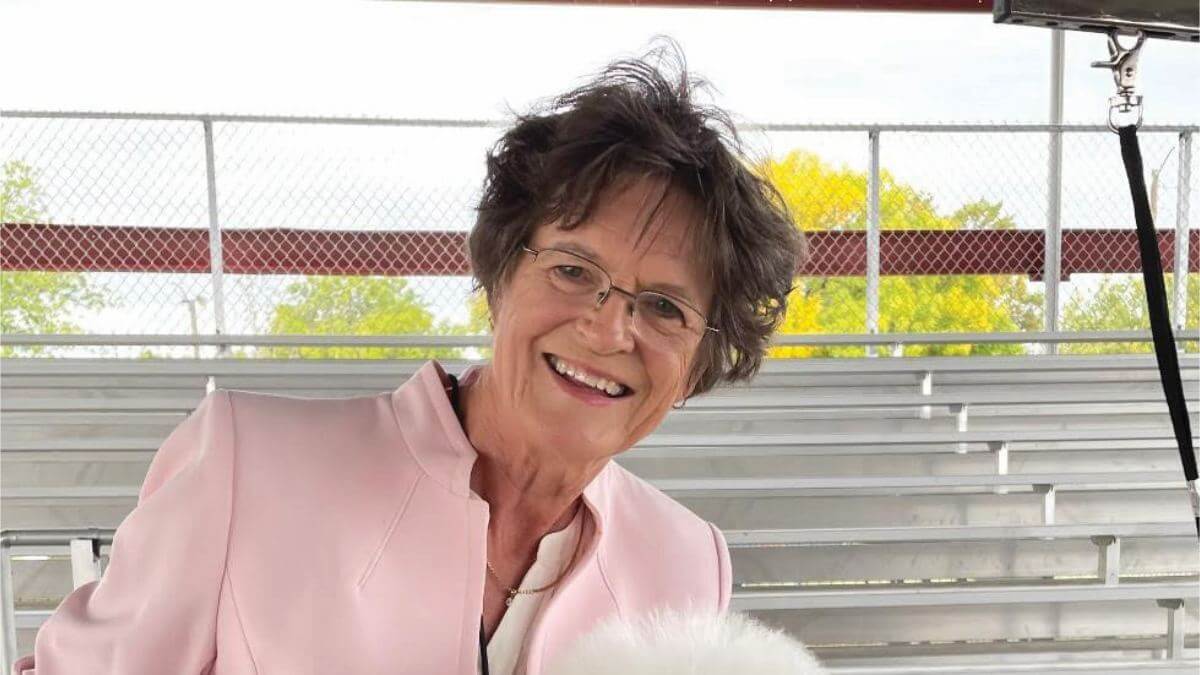
Home » Dr. Elanie P. Rude | Lemerle Bichons Frises & Standard Poodles

Dr. Elanie Rude: My history in purebred dogs goes back to the 1970s when I started breeding and exhibiting Standard Poodles. After 35 years, there are now 77 AKC Champion Lemerle Standard Poodles, with many Best in Show and Group winners as well as Obedience, Agility, Hunt Trial, and International Champions. As I had a very busy career at the University of Minnesota, working in the Veterinary Teaching Hospital (I am Professor Emeritus of Veterinary Anesthesiology), my handler, Terri Meyers, campaigned my dogs, although I had the pleasure of showing my dogs on many occasions. I had an extensive kennel set-up on 20 acres, with 100-foot covered runs and grassed paddocks for the Poodles to run and exercise. I went to work to support an expensive hobby!
Dr. Elanie Rude: My kennel name, LEMERLE, was chosen when I lived in Australia and is French (le merle = The Blackbird), as I was breeding only black Standard Poodles for the first 10 years. Later, I bred many beautiful silver, blue, and white champions such as my Am. Can. CH Lemerle French Silk (Monique), a multiple Best in Show winner and Top Producer who won Best of Variety at the Poodle Club of America National Specialty in 1995, the first and only silver to do so. Only once, in the beginning, I bred a champion black bitch to a blue dog. Otherwise, never bred the black dogs to any other color, thus maintaining a pure, lasting black colored-coat. Unfortunately, I see many color-crosses in Poodles now, which often result in mismarkings and fading coat colors.
Dr. Elanie Rude: When I retired, my husband Gary and I moved first to Colorado and eventually to sunny New Mexico. Our first Bichon Frise in 2006, “Roxie,” became a champion and we fell in love with the breed. They are so adorable, smart, and trainable, much like the Poodles. As we live in a regular house now and travel often with our dogs, we are restricted to two Bichons, and I have been lucky to have family and friends willing to give loving homes to our puppies. Our daughter in Minneapolis, Jennifer, has a boy from our first Bichon litter who just finished his championship at 9 months of age (CH Hallmark Lemerle He’s A Tornada). I have had much pleasure showing my own Bichons to their championships and competing as an owner-handler. My “Taylor” (GCH Hallmark GloryB White Diamonds By Lemerle) has been so much fun to show and she is currently No. 2 in the Bichon Owner-Handled ranking! I have been blessed with my mentor and breeder-friend Carol Fellbaum in Houston sharing her knowledge with me, a rookie Bichon exhibitor!
Dr. Elanie Rude: In Standard Poodles there are presently good entries at AKC shows in most states, which is very encouraging. Yet, keeping a Standard Poodle in full show coat is a very dedicated thing to do—I know, after the thousands of hours and numerous evenings spent doing maintenance baths on my own dogs. Each show dog was bathed and blow-dried once a week; at one time, I had as many as six Standards in show coat! A show Standard Poodle also requires a clean, dry environment with no mud, lots of wraps and bands, and no play-fighting. It’s a special lifestyle, with devotion to the hair needed to succeed, and I applaud all the owners of the Standards in the ring today. In retirement, I have found the Bichons easier to keep in show-coat. However, the entries in Bichons are very small or non-existent in many states in the US, which makes it very hard to achieve championships, especially grand championship status. We have had to travel to Arizona, Minnesota, and Texas with our Bichons. I am not sure why the Bichon is not more popular as show dogs as they are perfectly affectionate companions which can easily be kept in show coat—and for amateurs like me, reasonably easy to learn how to groom. A beautiful Bichon really stands out in the show ring and competes well at Group and Best in Show levels. I have the advantage of always having a stand blow dryer available, and by washing and conditioning with each weekly bath, followed by some scissoring to keep the hair in shape, I have not needed to brush my Poodles or my Bichons every day as many people do. I keep them as clean as possible and comb them out with a wide-tooth comb once mid-week. With this regime, I have never had a dog seriously matted, knowing that between 8–12 months in each breed the puppy coat starts to turn to the adult coat, so more care is needed to remove that dead hair. I think it is unfortunate the Bichon’s Breed Standard describes them as “white powder puff’ dogs as this gives many people the impression they are beautiful but fragile lapdogs, whereas Bichons are a small but sturdy breed. Judges of Bichons should certainly look for moderate boning, good musculature, strong white teeth, and plenty of body. Poodles excel in performance sports like Agility and Obedience, and Bichons do too, yet few people are training and competing with Bichons, which is sad. A well-bred Bichon is tough, and should have plenty of attitude, spunk, and personality for performance sports as well as for the Conformation show ring.
Dr. Elanie Rude: As a veterinary scientist, I have always been concerned with the health status of my Poodles, and now my Bichons. The Bichon Frise Club of America, and certainly the Poodle Club of America (I am a member of both national clubs) have devoted much financial support to research in diseases of these breeds. In the 1980s, I participated in the development of the first true genetic DNA test in Standard Poodles, for the bleeding disorder von Willebrand Disease, which was a game changer as it allowed conscientious breeders to eliminate the disease in two generations. Poodles now have numerous DNA tests available, which are far preferred in selection of breeding stock to visual tests (such as hip X-rays, eye tests, etc.). To date, Bichons have no DNA tests available for the common diseases of the breed. I have always performed the recommended genetic tests on my Poodles and Bichons and have never bred a dog that develops a genetic defect; I follow the CHIC guidelines for genetic testing. Yet, I see many Bichons being actively bred without published test results. In Standard Poodles, hip dysplasia, bloat (GDV), and Addison’s Disease were some of the problems encountered; in Bichons, eye diseases (especially cataracts) and patellar luxation are two of the problems breeders test for. I think one problem related to the small number of quality, well-bred Bichons in the US is the huge number of this small breed produced by commercial kennels (AKA “puppy-mills”). One only has to look on the Internet to see thousands of sad little Bichons offered for sale by such kennels. These Bichons often come from parents with serious health defects and poor temperaments and are never given the intensive three-month period of puppy socialization that serious breeders give each puppy, yet they end up in pet shops and family homes around the country and are often poor examples of this wonderful breed.
Dr. Elanie Rude: Bichons make great family dogs, as long as they are trained firmly but seriously, like “proper dogs,” and not pandered to like a lap dog or thought of as a “baby.”
Dr. Elanie Rude: I was asked to comment on what I think judges should know about
my breed(s):
Dr. Elanie Rude: When they win, they love to lick (kiss) the judge when they receive the ribbon and I am carrying them from the ring. They know how gorgeous they are!